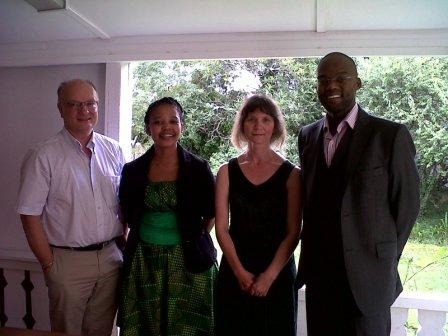
Last week the Department of Economics & Economic History and the Department of Political & International Studies jointly hosted Mr Wamkele Mene, Counsellor: Economic at South Africa’s Permanent Mission to the World Trade Organisation (WTO) in Geneva, at a lunchtime seminar entitled “The Doha Development Round: alive, with benefits?”.
Mr Mene, who addressed a lunchtime audience of between 50 and 60 postgraduate students and staff, is responsible for South Africa’s WTO negotiations on Trade in Services, Intellectual Property and Dispute Settlement.
He argued that the benefits for developing countries from participation in the Doha Round stem from access to a dispute settlement system under which even quite small developing countries can successfully challenge the behaviour of significantly larger players like the US.
In addition, the emergence of China, India and Brazil as major players in the global economy has had an important impact on the balance of power in groupings such as the WTO. However, this is not to say that the deal currently on the table at the Doha Round is not problematic for a variety of reasons.
Firstly, as things stand, South Africa would be expected to make the deepest cuts in industrial tariffs at the NAMA (Non-Agricultural Market Access) negotiations, which would have severe implications for its industrial policy and employment goals.
Secondly, developing countries are under strong pressure from developed countries to liberalise their services sectors. Developed country services markets are saturated and these countries are looking to penetrate developing economy services markets even before the latter have their own regulatory frameworks and service sector strategies in place.
Finally, countries like South Africa are seeking better terms of access for their agricultural products which remain important for employment and in terms of linkages with the rest of the economy, but face stiff competition from heavily subsidised developed country agricultural sectors.
Would the Doha Round of trade negotiations conclude this year? According to Mr Mene, the Doha Round is “alive…with some benefits”, but we just don’t know.
Prior to taking up his posting in Geneva, Mr Mene held the position of Director: Trade in Services at the International Trade & Economic Development Division of the Department of Trade & Industry, in Pretoria. As the head of the directorate, he guided South Africa’s overall participation in multilateral, bilateral and regional trade negotiations.
In addition to leading South Africa’s negotiations during an intense negotiating phase of the Doha Round of negotiations, he also led South Africa’s participation in the negotiation of the Economic Partnership Agreement with the European Union. At the same time, he was responsible for South Africa’s engagement in the SADC Services Trade Protocol negotiations.
Mr Mene is a regular guest speaker at academic institutions, where he lectures on the regulation of the international trading system. He is a graduate of Rhodes University and a former Rhodes SRC President, as well as a graduate of the Centre for International Studies & Diplomacy at the University of London in the UK.
Picture: (from left to right) Professor Paul Bischoff and Ms Siphokazi Magadla (from the Department of Political & International Studies), Ms Niki Cattaneo (from Economics & Economic History), and Mr Wamkele Mene

